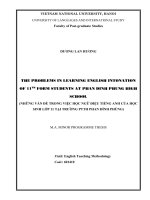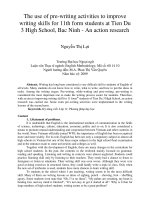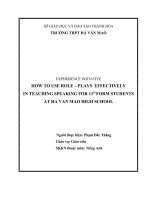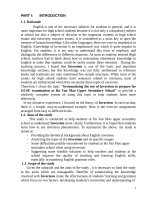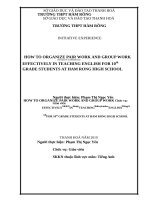How to use role – plays effectively in teaching speaking for 11th form students at ha van mao high school
Bạn đang xem bản rút gọn của tài liệu. Xem và tải ngay bản đầy đủ của tài liệu tại đây (159.21 KB, 22 trang )
SỞ GIÁO DỤC VÀ ĐÀO TẠO THANH HÓA
TRƯỜNG THPT HÀ VĂN MAO
EXPERRIENCE INITIATIVE
HOW TO USE ROLE – PLAYS EFFECTIVELY
IN TEACHING SPEAKING FOR 11th FORM STUDENTS
AT HA VAN MAO HIGH SCHOOL
Người thực hiện: Phạm Đắc Thắng
Chức vụ: Giáo viên
SKKN thuộc môn: Tiếng Anh
THANH HÓA NĂM 2018
CONTENTS
1. INTRODUCTION.
Page
1.1. REASONS FOR CHOOSING THE RESEARCH
1
1.2. AIMS OF THE RESEARCH
1
1.3. SCOPE, OBJECT AND RESEARCHING METHOD
2
2. MAIN CONTENT
2
2.1. BACKGROUND OF THEORY
2
2.1.1. What is Role - play?
2
2.1.2. Why use role-play?
2
2.2. POTENTIAL PROBLEMS
3
2.3. STEPS IN CARRYING OUT ROLE – PLAYS
4
2.3.1. Outside the classroom.
4
2.3.2. Inside the classroom.
4
2.3.3. Sample lesson plans.
4
2.4. RESULT AFTER APPLYING THE RESEARCH IN TEACHING
17
3. CONCLUSION AND SUGGESTIONS
18
1. INTRODUCTION:
1.1. REASONS FOR CHOOSING THE RESEARCH
Learning a language is a complex and long process as anyone who has tried
will agree. One of the most difficult and frustrating things is making the transition
from the classroom to the 'real' world. In the classroom, everyone knows you are a
student and mistakes are allowed, and the environment is contained and safe.
Speaking another language outside the classroom is completely different and often
students are lost at sea as soon as they step outside the door. Lists of memorized
vocabulary are suddenly useless when ordering in a restaurant.
The problem becomes more complicated when it comes to Vietnam setting.
English teachers in Vietnam have just adopted communicative approach for just a
few years since the using of the new textbooks. However, they have not paid
enough attention to speaking skill. The speaking tasks are simple, and more
importantly, impractical. With all above, I choose the topic “ How to use Role-play
effectively in teaching speaking for 11 th form students at Ha Van Mao High school”
to explore and give some solutions to the problem.
1.2. AIMS OF THE RESEARCH
In this writing, I would like to recommend a more practical way of teaching
speaking in high school classrooms; that is using role-plays and simulations. Roleplays, or simulations are one of the ways ESL instructors can ease students'
transition into using English in real world situations. A simulation is where students
act out a real-life situation, for example checking into at a hotel, but do not act out a
different personality. Role-plays are where students take on different personalities.
In a role-play, for example, one student may be asked to take on the role of "an
angry neighbor", which is out of character for the student.
The purpose of role playing is to give the students an opportunity to work
with others in determining how an individual or group might behave in response to
1
a particular situation. Role playing is often used primarily to promote classroom
discussion. The use of role playing as a cooperative learning model also includes
class discussion as a vital step, but in this approach the entire class is involved in
preparing and presenting role plays through group activity.
1.3. SCOPE, OBJECT AND RESEARCHING METHOD
- Scope : Researching in the process of teaching English 11 at Ha Van Mao
High School.
- Object: This subject is concerned with ways of organizing activities for 11th
form students in the class.
- Researching method: Reading reference books , discussing with other
teachers, applying in teaching, observing and drawing out experience.
2. MAIN CONTENT
2.1. Background of Theory
2.2.1. What is Role – play:
Role-play is any speaking activity when you either put yourself into
somebody else's shoes, or when you stay in your own shoes but put yourself into an
imaginary situation.
Imaginary people - The joy of role-play is that students can 'become' anyone
they like for a short time! The President, the Queen, a millionaire, a pop star ……..
the choice is endless! Students can also take on the opinions of someone else. 'For
and Against' debates can be used and the class can be split into those who are
expressing views in favour and those who are against the theme.
2.1.2. Why use role-play?
It is widely agreed that learning takes place when activities are engaging and
memorable. Jeremy Harmer advocates the use of role-play for the following
reasons:
* It's fun and motivating
2
* Quieter students get the chance to express themselves in a more forthright way
* The world of the classroom is broadened to include the outside world - thus
offering a much wider range of language opportunities
2.2. Potential Problems:
- The more engaging the better. The value of role-plays come from students
immersing themselves in the material.
- Choose a 'hot' topic and stage a debate. Assign students positions on the topic
(for/against). This will get students out of their personality and into the role where
they do not have the same inhibitions.
- Preparation is very important to success. Give students 'personality cards' which
sketch out their personal characteristics or scenario. Divide students into groups
and give them time to sketch out various scenarios, and go over extra or special
vocabulary, ask them to discuss how they will act, think about the character and
plan what they will say. For example, what are possible responses/replies for the
angry neighbor?
- The teacher, as facilitator of the role-play must support students in their role, i.e.
they 'are' in the backyard arguing over the fence. Don't do anything to interrupt the
pretended environment. Leave grammar correction to the end. Correcting students
in the middle of an argument interrupts the pretended environment. Make notes and
do a debriefing after.
- Exaggeration is good! Encourage students to exaggerate their actions, opinions
and movements. Exaggeration helps students immerse themselves in the role.
- Stage a rehearsal first. Have students practice their role in small groups with
coaching from the other students.
- While the role-play or debate is in progress, have other students suggest
vocabulary first, and act as backup if they do not know.
3
Role-plays are unpredictable, which makes them both a valuable learning
tool and at the same time difficult to manage. Sketch out the various routes the roleplay can take from the initial scenario. This will give you some idea what to expect
and avoid any surprises.
Role-plays can range from 30 minutes to 45 minutes.
2.3. STEPS IN CARRYING OUT ROLE – PLAYS:
2.3.1. Outside the classroom:
_ Choosing the topic, based on the topic of the lesson or the main grammar point of
that lesson.
_ Preparing materials, especially role-play cards (Teachers can make up the cards
themselves, or search for them on the Internet)
2.3.2. Inside the classroom:
_ Providing students with enough language to be used in their role-plays.
_ Setting up the scene for role-plays.
2.3.3. Sample lesson plans:
Unit 1: Friendship (English 11)
Version 1
Finding a Perfect Roommate/Flatmate Role-play
1. Materials:
Ranking Roommates: Vocabulary Warm-up
Room Ads: Listening Reading Comprehension Warm-up
Rooms for Rent Role Cards
Friends Looking for Rooms Role Cards
Students with Rooms for Rent Activity Sheet
Students with Friends Needing Rooms Activity Sheet
2. Purpose and Audience:
4
The purpose of these materials is to get the students to practice talking about the
qualities of good and bad roommates.
3. Target Language:
Describing people and their habits.
4. Warm up:
a) Group Discussion
Where do you live?
Do you live in a dormitory or with your family?
Who do you live with?
Are you happy where you live? Why or why not?
b) Pros and Cons Brainstorm
What do you think about shared accommodation?
What are the pros and cons of shared accommodation?
·
2 groups divided into Pros and Cons
·
then pair up Pro and Con to discuss
c) Which would you choose?
In groups of 3, put Shared Accommodation Ads in pile face down. Students
turn 1 up and explain to the group.
This accommodation is in (area).
It’s a (flat/house/townhouse)
There are (number) people living there.
It costs $____ a week.
(other information)
Would you like to live there? Why or why not? – Discuss
After going through all six ads, choose the best one for you and explain why.
The Perfect Flatmate
5
What kind of person is good to live with? Why?
Ranking Exercise:
In groups, students circle the ideal qualities of roommates using the Ranking
Exercise Vocabulary Sheet and then rank them in order of importance.
5. Role-play
Set-up:
The class is divided into two groups:
Group 1: These students have a room for rent at their house because a
roommate has just moved out. They will need a Room for Rent Role Card and a
Room for Rent Activity Sheet.
Group 2: These students have a friend who is looking for a place to live. They will
need a Friends Looking for a Place to Live Role Card and a Students with Friends
Needing a Room Activity Sheet.
The students should be given some time to read their role cards, ask
questions about vocabulary and then write down the concerns (from the role cards)
into the table headings (on the activity sheets).
Divide the class chairs into two lines facing each other (or if you like, have
an inner circle and outer circle). One line is for students with rooms to rent (Group
1)and the other line is for students who have friends who need a place to live
(Group 2).
Group 1 students approach group 2 students and ask them if the group 2
students know anybody who needs a place to live. Group 2 students tell them they
have a friend who is looking for a place. Group 2 will then ask questions to make
sure that their friend will be happy in the shared accommodation. Group 1 students
then ask questions about the friend to make sure that the friend is compatible.
Unit 1: Friendship (English 11)
Version 2
6
Matchmaking Roleplay
Duration:
15–20 min
Aim: Oral fluency practice
Requirements:
Lots of space
Summary: Each student is given a "child", and tries to pair him/her up with a
suitable partner.
Introduction
The students are initially organised into groups, with each group member
receiving a different information card describing their son or daughter. But the
actual speaking is done on a one-to-one basis, with the students mingling in their
group and talking to the other "parents".
Groups contain 8 to 10 students, so this mingling requires a classroom with
lots of space, and preferably no desks to obstruct movement.
Preparation
Print enough copies of ten_singles.doc so that each student can receive one
information card.
Optionally, use a different colour of paper for each set of information cards.
Procedure
If the information cards are all white, then the teachers need to organise the
students into groups of 8 or 10 first (ideally an even number, otherwise one poor
child will miss out on a husband or wife). If we have a different colour for each set
of information cards, then we can simply hand out the cards as you wish, and get
the students to form groups according to the colours after they have read the card.
Explain that we are going to give each student a son or daughter! Tell them
to read the card and imagine what the person is like: do you think they are
romantic? Friendly? Humourous? Hard-working?
7
Give out the cards and allow some time for reading. (If there are some
groups of eight, simply give them four male and four female information cards).
Explain that the students can add extra details that aren't on the card. For
example, does your child have a car or a motorbike? Is he/she clever? To encourage
this, give the students an extra minute to think of one detail to add.
Now explain that each person should talk to the "parents" of potential
husbands/wives. They should only speak to one person at a time. Once they have
heard about all the potential partners, students should agree on how to match them
up. Check:
If you have a daughter, who do you talk to? (parents of sons)
Do you talk in a group, or in pairs? (pairs)
If you have a daughter, then do you have to speak with everyone
in your group who has a son? (yes)
When you have spoken to everyone, what do you do? (agree on
the couples)
If some groups finish early, you can tell them to think of reasons why the
couples they have matched up are suitable.
Have a feedback session at the end, perhaps writing the results on
the board.
Your son, Tony, is a young doctor
Your daughter, Sue, works at a
who often works long hours at the
restaurant.
hospital. He is a quiet, thoughtful
because she likes talking to
person.
people. But she also wants to get
Your son, Paul, enjoys many sports
married and have a child.
Your daughter, Julie, owns a
such as football, basketball, and
bookshop and is often very busy.
mountain climbing. He works for a
Although she is young, the
She enjoys her job
8
small company.
He would like a
workers respect her, and she is
wife, but not children.
Your son, David, has an important
very generous to them.
Your daughter, Jenny, is studying
job at the bank. Your family is quite
chemical engineering at a top
rich, so David is used to good clothes
university.
and expensive holidays.
restaurants, watching movies, and
Your son, Martin, has a job as a
travelling.
Your daughter, Ingrid, is a shy
gardener but he thinks his work is
girl who works at a nearby
boring. In his spare time he paints,
factory. She’s an excellent piano
and enjoys reading poetry.
player, and usually plays for at
Your son, Edward, is studying
least an hour every day.
Your daughter, Emma, is a pretty
business at college. He talks a lot,
girl who dreams of becoming a
and is very confident (in fact some
movie
people think he is a bit bossy).
shopping, especially with her
She loves going to
actress.
She
enjoys
friends.
Unit 5: Illiteracy (English 11)
Reported speech role play
Teacher's notes:
1. After you have taught reported speech, put the students into groups of three.
2. Explain that one person in the three is a rich actress/actor, one is his/her
niece/nephew and the last person is the butler.
3. The actor/actress is hearing impaired and dying.
4. She is going to decide what to do with her money and house after her death.
5. Set up the class so that the actors/actresses are on one side of the room, the
nieces/nephews on the other and the butlers in the middle.
9
6. The butlers need to give messages from the nieces/nephews to the
actor/actress.
7. The aim is for the butler and the nephew/niece to be nice so that the
actor/actress will give them her money.
8. As they are doing this, the butler will use reported speech e.g. She said that
you are lazy and never visited her. He said he was busy and didn't have time. He
said that he was helping animals.
You are the niece/nephew of a very rich, famous hearing impaired actress.
You know that she hasn't got long to live. So, for the moment you are trying
to become her favorite relative in order to obtain her millions after she is dead. You
know that she loves animals and children. You also know that her dog is her closest
friend. What do you think will make her give you some money?
You are the butler to a rich, famous hearing impaired actress.
Actually she hasn't got long to live and so you are being very nice to her at
the moment, you think you have a good chance of being left her millions in her
will. You have always helped her and you have looked after her cats and dogs with
care. You think you should at least get the house which you have cleaned for nearly
40 years!
You don't like her niece/nephew who has suddenly made an
appearance.
You always have to act as a go between for the niece/nephew and aunt
because the aunt can never hear her relative.
You are a rich, famous, hearing impaired actress.
You know that you haven't got long for this world but you don't mind because
you have had a good life. You also know that your niece/nephew wants something
10
but you're not sure what.
You have already written your will but you are prepared to change it.
Your will: $ 2 million to be left to the animal rescue league (you love cats)
Your house will go to your dog. It has been a faithful companion animal and you
want it to have a home when you're gone.
Your jewelry will be sold at auction in order to raise money for the children's
hospital near your house. You haven't decided about the rest, a sum total of
$150,000. Your butler has always been good to you. Your niece/nephew is also
sweet. You are waiting to hear what they have to say. You feel that if they can show
you how good they really are you will give the money to either one of them.
As a follow up lesson:
Ask the students what type of words "hearing impaired" and "companion
animal" are i.e. politically correct. For homework ask the students to think/find of
more politically correct words. The students can compare their lists when they get
back into class.
Unit 9: The Post Office (English 11)
Role-play: I Need to Mail This Letter to Mexico
1. Materials:
Post Office Customer Activity Sheet
Post Office Clerk Activity Sheet
Post Office Rate Sheet
Customer Errands Sheets
2. Purpose and Audience:
11
This role-play is intended for false beginners who are working in the postal
industry or need some survival travel English skills. The role-play includes the
language for talking about delivering letters, parcels, packages, and postcards. The
role-play also presents an opportunity to go over numbers used for dollar amounts
such as $12.95 or $42.00. As well teachers can go over talking about the time
something takes such as 2-3 days (read two to three days or between two and three
days).
3. Warm-up:
As one possible warm-up, I bring a letter and a parcel into class and tell the
class that I have to deliver these. I ask where the post office is. After I get
directions, I tell them I'm worried because the letter is a very important letter and I
don't want it get lost in the mail or I tell them it's my friend's birthday next week
and I want the parcel to get there on time. I see what responses this elicits.
Hopefully, somebody will suggest I use a courier or special delivery. Then we talk
about rates and schedules writing down expressions on the board as needed.
Another possible warm-up is to give the parcel and letters to the students and
then start the class with: Welcome to Chris's Post Office. How can I help you?
If the students simply say that they want to mail the parcel, I counter with: That'll
be $1000 dollars please (or you could use an outrageous amount in the local
currency). Hopefully, this will draw a shocked response and they should start
inquiring as to why it's so expensive. I tell them it's because its super speedy
delivery. This should get them to inquire about other more reasonable options,
which is a big part of the role-play.
4. Class Set-up for Role-play:
The students are divided into customers doing errands at the post office and
post office clerks. The customers need a customer activity sheet and and errand list.
Post office clerks need a post office clerk activity sheet and a complete schedule of
12
postal rates. I usually have a row of desks with all of the post office clerks on one
side and all of the customers sitting on the other.
5. Class Activity:
Customers go from post office to post office mailing one item on their errand
list at a time. While doing this, they should record the prices and delivery times on
the customer activity sheet. Post office clerks wait for customers to come into their
post offices. The clerks then give the customers the required information and fill
out their postal clerk activity sheets.
Vietnam
Surface
Air
Special
Delivery
$5.95
2-4
Letters
$1.50
Parcels
days
$18.00 10-12 $29.50
days
4-6
days
8-10
days
$12.50
4-6
weeks
Postcards
$0.50
8-10
Courier
$25.50
Overnight
days
England
Surface
Air
Delivery
$5.50 2-4
Letters
$1.40
Parcels
weeks
$21.50 1-2
days
$41.00 4-6
weeks
1-2
days
$12.00 6-8
weeks
Postcards
$0.70
1-2
Special
Courier
$18.75 1-2 days
weeks
Unit 10: Nature in Danger (English 11)
13
Version 1
ROLE PLAY:
A discussion between different parties interested in global warming.
Team up with classmates who have been assigned the same role to develop your
roles and discuss ideas and “strategies” before the role play begins. Introduce
yourself to the other role players. Discuss your roles after the role play ends.
Role A – Penguin leader
You live in Antarctica. You need global warming to stop. Temperatures must
actually get cooler. Your species is at great risk of extinction. Your habitat, the ice, is
melting and your sources of food are disappearing. The world must act to save you.
The day the last penguin dies is the start of the end of the Earth.
Role B – Dessert dweller
You like the recent effects of global warming. It has brought a lot of unexpected rain
to your land. For the first time you can grow things. You have bumper harvests. You
have lots of water to drink. You think global warming is simply a matter or winners
and losers. You think global warming or cooling has always happened.
Role C – Worried Martian
Billions of years ago, Mars, your planet, looked like Earth. Life was everywhere.
However, greedy Martians controlled the energy sources and the Mars climate
changed, killing all life – except you. The greedy Martians paid leaders to pretend
nothing was happening and that alternative energies would arise. It was all too late.
Advise the Earthlings and the penguins of the dangers of climate change.
Role D – U.S. President
You are terrified of taking measures to control global warming because you might
lose your power. You believe scientists can build a huge machine to re-freeze the ice
caps. You think keeping American jobs is more important than penguin food. You
know better than the world’s climate experts. You don’t believe in aliens.
14
Unit 10: Nature in Danger (English 11)
Version 2
Role play activity: The Environment - Disposing of Car Waste
This is your chance to discuss some of the issues that the European Parliament
makes decisions about. The characters involved in your role play are:
Tony Fallon, Environmental campaigner
Trevor Grey, MEP
Sally Whiting, Car owner
Simone Taylor, Resident of Chippingham Estate
Grace Pemberton, Spokesperson for Viva UK (a car manufacturer)
These characters are fictional (this means they are not real people) but there are
people like them who have similar opinions.
Your discussion question is: Should car owners be responsible for disposing of
their worn out cars?
Your character is: Tony Fallon, Environmental campaigner
You are pleased that the European Parliament is making an effort to
minimise the damage to the environment that results from car waste as you are
concerned that, up to now, all the petrol and oil has been left to seep into our earth.
However, you believe that this does nothing to deter people from buying new cars
or to stop the ever-increasing level of car usage and consequent pollution. You want
the European Parliament to put the environment first, not the interests of greedy
car manufacturers. You can’t understand why the European Parliament doesn’t put
pressure on car manufacturers to design cars that last for longer.
Your character is: Trevor Grey, MEP
You and your colleagues in the European Parliament have worked hard to
come up with a solution to the problem of vehicle waste and you are confident that
15
this will make people responsible for disposing of their vehicle with the
environment in mind. You believe that the European Parliament has balanced the
interest of consumers and manufacturers whilst putting the environment first.
Your character is: Sally Whiting, Car owner
You’re very suspicious about this European Parliament proposal. You agree
that car owners should be responsible for getting rid of their worn out cars but you
think that you’ll end up paying for this new measure in the end. The car
manufacturers will probably put up their prices. You already pay through the nose
to run your car, which you need for your business and to drive your disabled son to
school. Why shouldn’t the government (which gets all the money you pay in tax)
pay to protect the environment?
Your character is: Simone Taylor, Resident of Chippingham Estate
You think that this is a great idea. Anything that gets rid of this dangerous
junk from the streets is fine by you. Kids love playing on these old cars that people
have simply abandoned and you worry that your kids are going to hurt themselves.
You believe that people need to take responsibility for things they buy. If you buy it
– you’re responsible for disposing of it in a safe and sensible way. You don’t
understand why the European Parliament is involved though. Surely the local
council or government can sort this out without getting the European Union
involved?
Your character is: Grace Pemberton, Spokesperson for Viva UK (a car
manufacturer)
Cars are an important part of modern life and your company fully supports
the European Parliament’s proposal to make people dispose of them responsibly.
Viva UK is committed to protecting the environment and is happy to contribute
toward these measures. You want to reassure car owners that Viva UK is prepared
16
to put its money where its mouth is and bear at least part of the cost of disposing of
cars safely.
2.4. RESULT AFTER APPLYING THE RESEARCH IN TEACHING
School year 2016- 2017
Before applying:
Class
Students
11a2
36
11a7
40
After applying :
Excelent
2
0
Good
4
3
Average
22
24
Weak (bad)
8
13
Class
11a2
11a7
Excelent
4
1
Good
7
6
Average
20
25
Weak (bad)
5
8
Excelent
1
0
Good
5
4
Average
22
23
Weak (bad)
7
11
Class
Students
Excelent
Good
11a2
35
3
10
11a7
38
1
8
3. CONCLUSION AND SUGGESTIONS:
Average
18
23
Weak (bad)
4
6
Students
36
40
School year 2017- 2018
Before applying:
Class
Students
11a2
35
11a7
38
After applying :
Role-plays require more imagination by students and teacher and can be
difficult to manage because they are unpredictable. The initial scenario develops
from the students interacting with each other and can literally go in any direction.
This gives students practice in a non-threatening environment, and gives the
17
motivation and involvement where they have to think in English. Role-plays are
interesting, memorable and engaging, and students retain the material they have
learned. In their assumed role, students drop their shyness and other personality and
cultural inhibitions, making them one of the best tools available for teaching a
second language.
Staging role-plays can be challenging for an instructor, but also great fun.
After you have done a few, you will know what to expect and feel more confident.
My experience is students love them, retain what they learn, and often leave the
classroom laughing and still arguing.
XÁC NHẬN CỦA THỦ TRƯỞNG ĐƠN VỊ
Ngày 25 tháng 4 năm 2018
Tôi xin cam đoan đây là SKKN
của mình viết, không sao chép
nội dung của người khác.
Người thực hiện
Phạm Đắc Thắng
18
REFERENCE BOOKS
1. Practical handbook of language teaching (David Cross)
2. A course in language teaching - Practical and Theory (Penny Ur)
Cambrige University Press
3. Giáo trình giáo học pháp (Tổ ngoại ngữ –Khoa ngôn ngữ và văn hóa Anh - Mĩ Úc – Trường đại học quốc gia Hà Nội)
4. Phương pháp dạy tiếng Anh Trung học phổ thông (Nguyễn Hạnh Dung)
5. www.teachingenglish.org.uk ( British Council)
